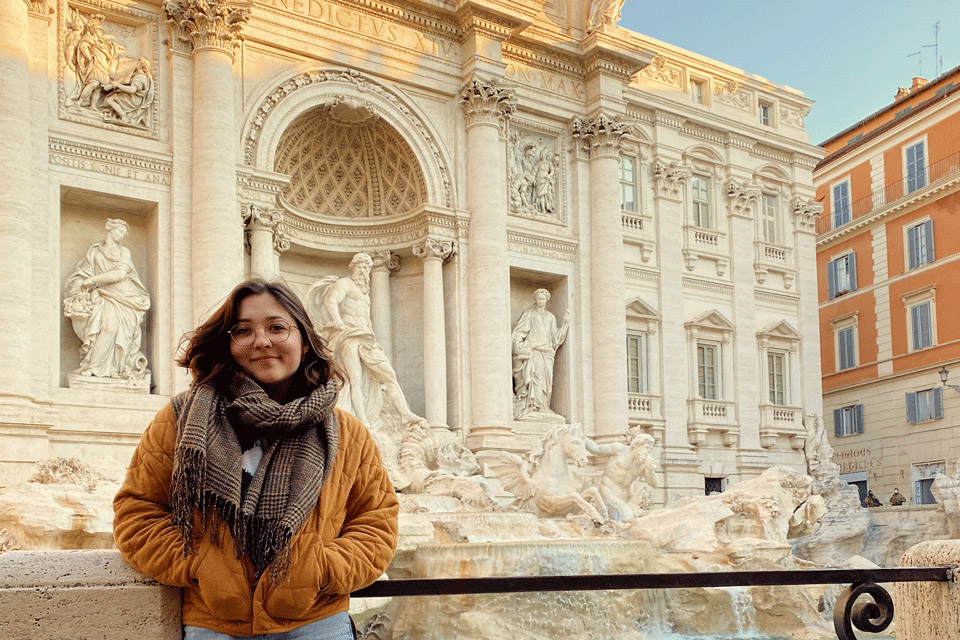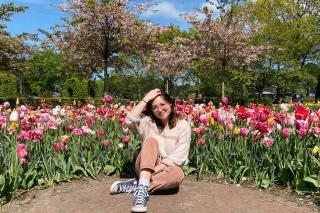Tell us about your Simmons experience.
Simmons was all about growth for me. I'm from a relatively small town in Indiana, so moving to Boston was a big step. It gave me a chance to be an individual, separate from my family and friends, which led to a lot of personal growth. Time in and out of the classroom helped me become confident in myself and my abilities. I learned that it was okay to ask questions and even to mess up, that's the best way to learn. Now I'm confident in my abilities as a woman in STEM.
While at Simmons I worked in the Undergraduate Admission Office, offering tours and interviewing prospective students. I also stepped into a leadership position in the Student Council, eventually becoming Class President. This was definitely a growth experience during COVID, trying to figure out how to make people happy when no one was happy. Simmons helped me grow in so many ways, and it gave me the confidence to move internationally.
What do you like most about Data Science (DS)?

I love the idea of Data Science, in that you can apply it to pretty much anything. I had so many interests when I started at Simmons — Math, Theater, English, Art History — and I didn't want to limit my future opportunities by choosing a small niche. In Data Science, you take your core DS skills along with math, coding, research, testing, and apply that to anything. You can apply it to Art History, Publishing, or you can stay in technology or bioinformatics, the whole world is open for you. You can go into any industry with a background in DS, which is exciting, and seemed like the perfect fit for me.
My specific interest is in natural language processing. It's a subfield of computer & data science that looks specifically at using text as data, and how we can train computers to understand different aspects of natural language (aspects like sarcasm, jokes, emotions, sentiment, etc). Many companies use national language processing, from social media platforms, to insurance companies. I'm applying to any jobs that interest me — helping pediatric cancer research, or looking at the use of public parks. I've applied for so many different things and my one criterion is natural language processing, which can also pay better than other jobs in that field.
I loved studying DS at a liberal arts institution for undergrad, as it afforded a wider look at technology and data and how it impacts the world. It's important, especially when you get into the ethics of personal data and AI, I didn't want to lose that personal viewpoint.
What made you want to pursue a Master's degree?
I wasn't sure if I wanted to get my PhD or go straight into the industry. DS is such a huge field and encompasses so many things, you can only learn so much of it in undergrad. I had a taste of data learning, machine learning, and artificial intelligence, so I knew what was out there. When I was searching for jobs, the most interesting ones required a master's degree. I knew I was interested in learning more, so it made the most sense to go into a master's degree program.
Tell us about your studies at the London School of Economics (LSE).
Many of the DS programs I found are geared toward people working in the industry who want to pivot to DS. I knew about DS already and didn't want to start on the ground floor. Also, I wanted to study internationally. LSE is ranked as one of the best schools in the world, and was the most selective program to which I applied. Their DS program is for people with a background in DS, intended to further your education, not to start from the beginning. It's a 12 month program, so I can complete it in one year.
Also, the structure of the program interested me, which includes a large capstone project done as a group. For the Capstone group thesis, students are partnered with an industry sponsor. I've been working with LSE to track misinformation about COVID-19 and the vaccine posted via Twitter. We've researched where the misinformation is coming from, trying to dig into the latent hidden patterns. We're trying to create a model that can flag misinformation without knowing what that misinformation will look like. Since there is no way to know what the next wave of misinformation will be, we want to identify it without using particular keywords. Can natural language processing catch what's sarcasm and what's not? Essentially we're using machine learning to train a model that can flag the misinformation without just relying on keywords.

How did Simmons prepare you for your Master's?
I definitely feel like I was very empowered as a student at Simmons, and that made me comfortable enough to pursue a master's, even one in another country, at a University with a 3% acceptance rate.
Simmons is a small school, and I made connections with faculty, attended conferences, and connected to the technology community in Boston. I was allowed the flexibility to do an independent study if there was a class I wanted to take that didn't fit my schedule, and I was able to pursue my own research. Simmons fosters confidence, which is especially important as a woman in STEM, in a space where I felt universally supported. It's not what the real world is like, but I could develop in my community and then step out into a coed program or into a job and have that confidence in myself.
All of my peers have been wonderful at LSE, but growing that confidence during undergrad means that I have it in grad school, where you're left to your own devices a bit more. I go to faculty office hours, ask questions, and create my own study schedule. I gained so much confidence in myself and my abilities by relying on a support system and learning to ask questions.
Any advice for Simmons students considering studying abroad?
Just do it! At least look into it, don't write it off. I studied abroad twice while at Simmons — a travel course and a world challenge — but both were short term. It didn't make sense to do a full semester abroad while at Simmons as it didn't fit in my schedule, and I wanted to be involved on campus, in the Admission Office, and in Sharkhack. But I still really wanted to have a longer experience abroad. Doing a master's abroad isn't on everyone's radar, but I looked into it and thought, I could definitely do that! I looked at opportunities in the UK, Canada, and Finland and found that a lot of master's programs abroad are one year programs instead of two, as they are in the U.S.
I had never been to London before I moved here, just packed my bags and left — totally outside of my comfort zone. But it's been so cool to be able to live here! I've met so many international students at LSE, people from all over the world. In spite of COVID I've been able to travel quite a bit, as you can get around so easily here. I recently traveled with a friend of mine to the French countryside.
Getting your master's abroad can also help your credentials if you want to live abroad after your studies. Consider the reputation of the school, and where you want to live after graduation. Some schools have a good reputation in their location but not necessarily an international reputation.
Favorite spot in London?
I live near Battersea Park and I think it's London's most underrated park — you get a beautiful view of the river and it's absolutely gorgeous. My favorite thing to do is to try new restaurants. I'm a foodie and London is such an international city, so you can get really interesting niche restaurants. My current favorite is Fatt Pundit in Covent Garden, an Indo-Chinese fusion restaurant unlike anything I've ever tried before.
I love to explore new neighborhoods through food. Earlier this year I took a day trip to watch my friends run in the Vienna Marathon, then we went to Amsterdam on King's Day. It's easy to hop on a super quick and cheap flight and go anywhere. It's been unlike anything else I've ever experienced.

